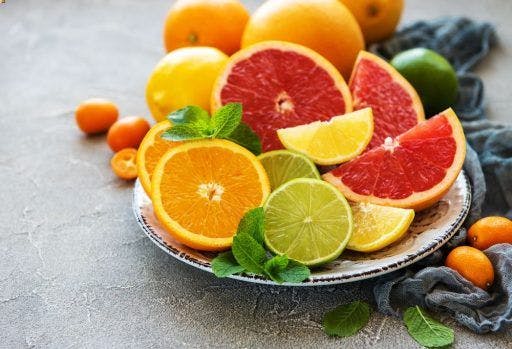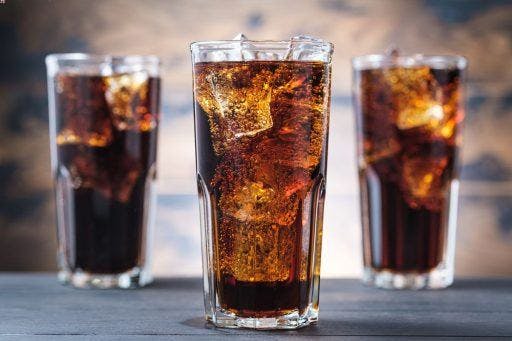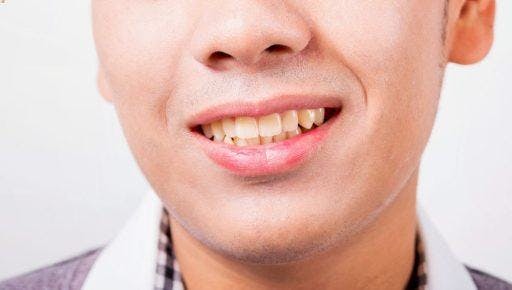Sugar and sweet treats always get a bad rap for wreaking havoc on everyone’s oral health. But they’re not all to blame. News flash: Highly acidic foods and drinks can also harm your teeth. Just how much damage can your favourite citrus fruits, carbonated beverages, and fermented ingredients cause? Read on for the full lowdown.
Understanding Acidic Foods and Beverages

Love starting your day with juicy, chilled orange wedges? Can’t enjoy a meal without a tall glass of freshly squeezed lemonade? Do you prefer your greens drizzled with balsamic vinaigrette and topped with tart tomatoes and grated Parmesan? These preferences reveal an affinity for acidic food. But they also indicate possible damage to your teeth.
How to determine if food is acidic?
The accurate way to measure the acidity of a substance is to determine its pH level on a 14-point scale. A pH value of 7 is neutral. Anything below this midpoint indicates acidity, while anything above suggests alkalinity. For food, items with a pH level below 4.6 are acidic.
This pH scale also identifies the presence of positively and negatively charged hydrogen ions in a substance. The higher the concentration of hydrogen ions in a food item, the lower it falls on the scale and the higher its acidity.
For example, eggs fall somewhere near 7, while black coffee lands at 5. Ketchup is a 4, wine is around 3, and lemon juice is 2.
Acidic foods that damage teeth

Here’s a comprehensive list of acidic foods and beverages you should consume moderately.
- Citrus fruits – oranges, lemons, limes, grapefruits, and tangerines
- Other fruits – apples, pineapples, peaches, grapes, plums, blueberries, cranberries, and pomegranates
- Fresh tomatoes and tomato products – juice, paste, ketchup, salsa, soup, hot sauce, pasta sauce, and pizza sauce
- Fruit juices
- Jams, jellies, and other spreads
- Vinegar
- Barbecue sauce
- Fermented food – sauerkraut, pickles, and kimchi
- Dairy products – sour cream and aged cheeses
- Sour gummies and fruit-flavoured candies
- Carbonated beverages – regular or diet soda, sparkling water
- Alcoholic beverages – wine, beer, cider, prosecco, liqueur
- Coffee
- Sports and energy drinks
- Vitamin water
- Kombucha
- Citrus-flavoured tea
Why Do Acidic Foods Hurt Your Teeth?

Consuming high levels of acid weakens the enamel of your teeth. This process is called dental erosion, a type of tooth wear that can lead to exposure of the dentin layer.
At this point, teeth become sensitive and more vulnerable to plaque and bacteria that cause cavities, decay, and infections. Additionally, the Australian Dental Association (ADA) points out that tooth erosion can alter the appearance of your teeth.
The stages of tooth erosion
The ADA also emphasises that tooth erosion commonly affects the top, biting surfaces and the inside surfaces of teeth. The process happens in two stages:
Stage 1: Erosion
Acids coat the surface of the teeth, leading to demineralisation. Consequently, the outside surface becomes softened.
Stage 2: Wear
Various forces rubbing on the teeth, including other teeth, cause the soft and weak enamel to wear away.
Do all acidic foods lead to erosion?
Research published by the European Journal of Dentistry revealed that vinegar, apple cider, and lemon juice induce maximum changes to the tooth structure. Additionally, it confirmed that drinking dark colas leads to the most severe discolouration.
Meanwhile, a Journal of Dentistry study found that acidic juices are the top cause of erosion among teens and young adults, while fruits are the main culprit for the elderly.
Ultimately, the occurrence of tooth erosion depends on how much and how often you consume any acidic food. Also, what you do after eating and drinking is crucial to blocking these detrimental effects.
Healthy Habits to Protect Your Teeth From Acid

Turn to the following consumption habits to steer clear of the damaging effects of acids on your oral health:
- Eat healthy, well-balanced meals always.
- Avoid sucking on citrus fruits, which can hasten the softening of teeth enamel.
- Do not eat three hours before sleeping to reduce acid reflux.
- Use a straw when drinking acidic beverages.
- Drink enough water after eating acidic dishes, including between meals and after drinking caffeinated or carbonated beverages.
- After eating or drinking, chew sugar-free gum for 20 minutes to increase acid-neutralising saliva.
- Maintain excellent oral hygiene by brushing and flossing properly and visiting your dentist regularly.
- Wait at least 30 minutes after eating acidic items before brushing your teeth.
- Fix teeth misalignment with orthodontic appliances like ClearCorrect aligners to keep food particles and bacteria from getting stuck between teeth.
- When planning meals, pair acidic foods with food with higher pH levels.
What foods have low acidity?
Consider incorporating these food items to your diet to avoid the harmful effects of acid.
- Lentils
- Peas
- Beans – soy, garbanzo, kidney, lima, navy, and black
- Fruits – bananas, papayas, mangoes, melons, cantaloupes, honeydews, and watermelons
- Vegetables – asparagus, broccoli, corn, peppers, and spinach
- Tubers – potatoes, sweet potatoes, and yams
- Rice
- Bread
- Fats and oils
- Herbs and spices
- Tofu
- Miso
- Tempeh
- Fish and shellfish
- Milk
- Herbal or green tea
The ADA shares this reminder: “Tooth erosion is the result of an individual’s diet and oral hygiene habits adding up over time.” So, moderate your consumption of acidic foods to keep your teeth in excellent form. No need to avoid them completely; just be more conscious when eating them and take proactive steps to dodge their harmful effects.
References:
Department of Health & Human Services. (n.d.-a). Dental erosion. Better Health Channel.
Department of Health & Human Services. (n.d.-e). Teeth and mouth care. Better Health Channel.
Eating disorders. (2019). Australian Dental Association.
Kitasako, Y., Sasaki, Y., Takagaki, T., Sadr, A., & Tagami, J. (2015). Age-specific prevalence of erosive tooth wear by acidic diet and gastroesophageal reflux in Japan. Journal of Dentistry, 43(4), 418–423.
Maladkar, S. R., Yadav, P., Muniraja, A. N. A., Uchil, G. S., George, L. V., Augustine, D., Rao, R. S., Patil, S., Sowmya, S., & Haragannavar, V. C. (2022). Erosive Effect of Acidic Beverages and Dietary Preservatives on Extracted Human Teeth—An In Vitro Analysis. European Journal of Dentistry, 16(04), 919–929.
Tooth erosion – Australian Dental Association. (n.d.). Teeth.org.au.



